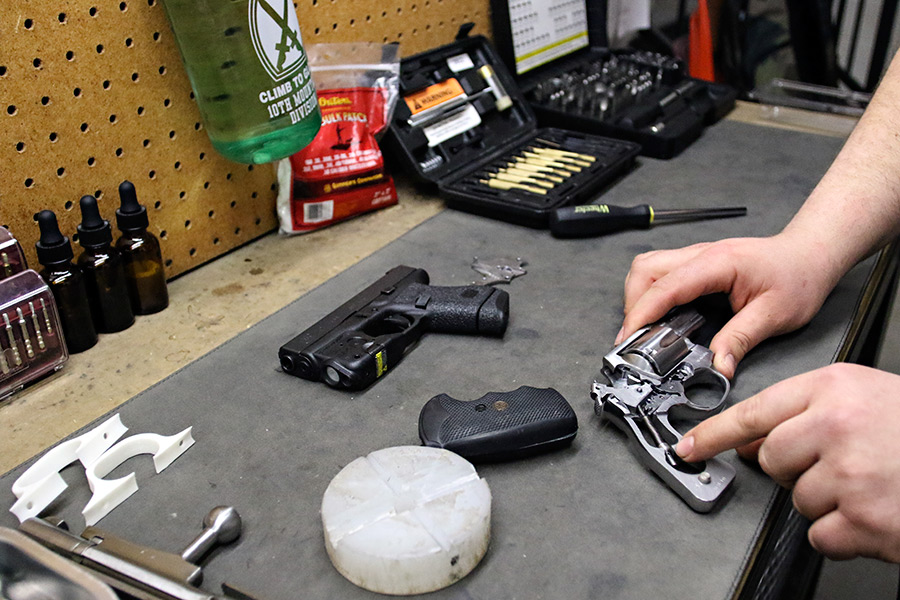Building Programs to Boost Local Jobs
FVCC’s course list includes unique programs specifically designed to prepare workers for local employment opportunities, including in health care, manufacturing and firearms
By Molly Priddy
Michael Thompson’s father couldn’t figure why the safety mechanism on his .38 Special was sticking.
A dutiful son, Thompson took the handgun to his firearms course at Flathead Valley Community College, put it on his workbench, and got to work figuring out the puzzle.
“It was very overwhelming when I first started,” Thompson said. “But once I started fixing things, I found I loved it.”
As part of the Firearms Technologies program at FVCC, Thompson not only had a full firearms work area at his disposal, but also about 50 years of combined knowledge in his course instructors, including Fred Zeglin, the Firearms Technologies coordinator.
The .38 Special was an unusual case, Zeglin said, because the solution didn’t immediately present itself.
“Most of the time, I know,” Zeglin said of the various firearm malfunctions he’s seen. “But this gun’s doing stuff. It’s fun when a real puzzle shows up.”
Firearms Technologies is a relatively new program in the FVCC catalog, one that was developed with local firearms businesses during the tough recession years. It was a part-time summer program, but Zeglin said that talking to industry leaders in the valley gave the college a good idea of what the businesses were looking for in terms of skilled workers, and the college wanted to help put local people in those jobs.
Now, Firearms Technologies is a certificate program designed to provide a solid foundation in vocabulary, theory, design, and function. Darlene Schottle, vice president of instruction and student services at FVCC, said the firearms program is one of multiple standouts that make FVCC a popular destination for people looking to get back into the workforce, either to train for a new occupation or to enhance skills for an old one.
“We’ve found valley wide that there’s a real interest in doing certificate programs in manufacturing and firearms,” Schottle said.
The college’s manufacturing programs were also bulked up during the recession to include skills for local workers seeking new jobs.
“Those aren’t usually paid highly enough that you can attract people from out of the region, so you need to go to your local workforce to provide them the opportunities,” Schottle said.
This method of creating new programs to build ideal workers for local businesses is also prevalent in the college’s health care and medical-based programs.
Recently added programs include courses for laboratory technician, surgical technician, and physical therapy assistant, which Schottle said are always at max capacity with waiting lists. The nursing programs, including CNAs and LPNs, are also popular.
“The other one that we’re actually just working with the medical community to develop is the medical lab technician program,” Schottle said.
Other popular programs are those with the recently added capability of completing a four-year degree while staying in the Flathead Valley. These include the registered nursing program and elementary school teaching program, during which students take two years of classes at FVCC, then two more remotely from a state university through online coursework and a local advisor.
“That’s for people who live in the community who want to complete the four-year degree but don’t want to relocate,” Schottle said. “ I can see that growing in the future as well.”
FVCC doesn’t want to fall behind in technology either, Schottle said, and has developed programming courses for gaming technology and geospatial technology, such as GPS.
Those courses offer a skillset, not necessarily a degree, so existing employees can beef up their skills at their current job or add those crucial services to their resumes.
FVCC also offers four programs unique to two-year colleges in the state: The Culinary Institute of Montana, the Brewery Science and Operations program, the goldsmithing program, and the surveying program. Schottle said those classes attract students from all over the state.
At the firearms workshop, Thompson said he chose to go to FVCC because he learned to love firearms when he was a machine gunner for an infantry platoon in the U.S. Army from 2010 to 2013. He worked as an armorer, so he handled weapons of all kinds.
“When I got out of the Army, I didn’t know what I wanted to do,” Thompson said. “I came to the college looking for a small business degree for a gunsmithing business I wanted to run.”
But when his advisor told him about the firearms program, Thompson was hooked. Now he’s a full-time student, coming to class after his shift at Costco. He wants to eventually turn his knowledge into a firearm repair business.
As for the .38 Special, it took a few hours of trial and error, but Thompson discovered that a spring wasn’t holding enough tension. He had to drill a new space in the gun’s handle to allow for a fix, but the solution seems to be working.
When asked if he planned on returning the gun to his father after he’d worked so hard to fix it, Thompson just laughed.
“Of course,” he said.